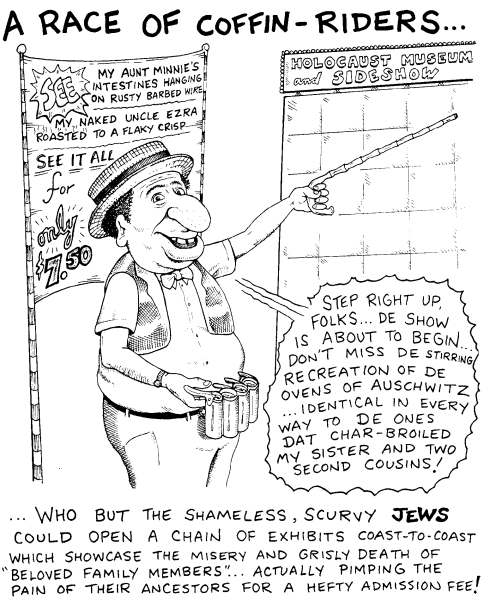The Website of Carlos Whitlock Porter
SHORT LIST OF HOAXOCO$T
ABSURDITIES (anonymous)
· Mass graves expelling geysers of blood; [1]
· Acid or boiling-water baths to produce human skeletons; [2]
· Injections into the eyes of inmates to change their eye color;
[3]
· Production of shrunken heads from bodies of inmates; [4]
· Skimming off boiling human fat from open-air cremation fires;
[5]
· Out of pity for complete strangers – a Jewish mother and her
child – an SS-man voluntarily leaps into the gas chamber at the last second to
die with them; [6]
· Soap production from human fat, solemn burial of soap; [7]
· Underground mass extermination in enormous rooms by means of
high voltage electricity; [8]
· Killing in vacuum chamber or with steam or chlorine gas; [9]
· Mass graves with hundreds of thousands of bodies, removed
without a trace within a few weeks; a true miracle of improvisation on the part of the Germans; [10]
· Gas chambers on wheels in Treblinka, which dumped their victims
directly into burning pits; delayed-action poison gas that allowed the victims
to leave the gas chambers and walk to the mass graves by themselves; [11]
· Electrical conveyor-belt executions; [12]
· Cremation of bodies in blast furnaces; [13]
· SS bicycle races in the gas chamber of Birkenau; [14]
· Removal of corpses by blasting, i.e., blowing them up; [15]
· Blue haze after gassing with hydrocyanic acid (which is
colorless); [16]
· Singing of national anthems and the Internationale by the victims in the gas chamber; evidence of
atrocity propaganda of Communist origin; [17]
· Rapid-construction portable gas chamber sheds; [18]
· Killing by drinking a glass of liquid hydrocyanic acid; [19]
· Muscles cut from the legs of executed inmates contract so
strongly that it makes the buckets jump about; [20]
· Introduction of Zyklon gas into the gas chambers of Auschwitz
through shower heads or from steel bottles; [21]
· Manufacture of sausages of human flesh by the SS in the
crematoria; [22]
· Mummified human thumbs used as light switches in the home of
Ilse Koch, wife of concentratoin camp commander Koch (Buchenwald); [23]
[1] A. Rückerl, op. cit. (note 141), p.
273f.; E. Wiesel, Paroles d’Etranger, Edition du Seuil, Paris 1982, p. 86; A.
Eichmann, in: H. Arendt, op. cit. (note 179), p. 184; B. Naumann, op. cit.
(note 142), p. 214.
[2] F. Müller, in: H. Langbein, op. cit.
(note 151), v. 1, p. 87; witness Wells in the Eichmann Trial, in: F. J.
Scheidl, op. cit. (note 74), v. 4, p. 236.
[3] H. Langbein, Menschen in Auschwitz, op.
cit. (note 152), pp. 383f.
[4] H. Langbein, ibid., p. 381.
[5] R. Höß, in: M. Broszat (ed.), op. cit.
(note 71), p. 130; H. Tauber, in: J.-C. Pressac, op. cit. (note 17), pp. 489f.;
F. Müller, Sonderbehandlung,
Steinhausen, Munich 1979, pp. 207f., 217ff.; H. Langbein, Menschen in Auschwitz, op. cit. (note 152), p. 148; B. Naumann, op.
cit. (note 142), pp. 10, 334f., 443; S. Steinberg, according to: Französisches
Büro des Informationsdienstes über
Kriegsverbrechen (ed.),
Konzentrationslager Dokument 321, Reprint 2001, Frankfurt/Main 1993, p. 206;
and many more.
[6] E. Bonhoeffer, op. cit. (note 213), pp.
48f.
[7] S. Wiesenthal, Der neue Weg (Vienna), 15/16 & 17/18, 1946; the Soviets wanted
to make this one of the charges at the IMT (Exhibit USSR-393), but this plan
failed due to the other Allies; cf. H. Härtle, Freispruch für Deutschland, Schütz, Göttingen 1965, pp. 126ff.; the
Greenwood Cemetery in Atlanta (Georgia, USA) is not the only site to boast a Holocaust-memorial
gravestone for 4 bars of “Jewish soap”. Cf. also the following corrections: R.
Harwood, D. Felderer, JHR 1(2) (1980) pp. 131-139; M. Weber, JHR 11(2) (1991)
pp. 217-227.
[8] Aside from C. Mattogno, op. cit. (note
339), cf. esp. S. Szende, Der letzte Jude
aus Polen, Europa-Verlag, Zürich 1945; S. Wiesenthal, Der neue Weg (Vienna), 19/20, 1946.
[9] Aside from C. Mattogno, op. cit. (note
339), cf. esp. W. Grossmann, Die Hölle
von Treblinka, Verlag für fremdsprachige
Literatur, Moscow 1947; The Black Book of Polish Jewry, Roy
Publishers, New York 1943.
[10] Aside from note 349, cf. also W. Benz, Dimension des Völkermords, Oldenbourg,
Munich 1991; pp. 320, 469, 479, 489, 537ff.
[11] Reports of the Polish
underground movement, Archiv der Polnischen Vereinigten Arbeiterpartei,
202/III, v. 7, pp. 120f., quoted in: P. Longerich, op. cit. (note 271), p. 438.
[12] Pravda, Feb. 2, 1945, cf. U. Walendy,
Historische Tatsachen No. 31: “Die
Befreiung von Auschwitz 1945”,
Verlag für Volkstum und Zeitgeschichtsforschung, Vlotho 1987, p. 4.
[13] H. von Moltke, Briefe an Freya 1939-1945, Beck, Munich
1988, p. 420; cf. P. Longerich (ed.), op. cit. (note 271), p. 435; Pravda, Feb.
2, 1945.
[14] Nürnberger Nachrichten, Sept. 11, 1978,
reported eyewitness testimony in jury court trial, Aschaffenburg, Germany.
[15] R. Höß, in: M. Broszat (ed.), op. cit.
(note 71), pp. 161f.; A. Rückerl, NS-Prozesse,
op. cit. (note 127), p. 78; H. Grabitz, NS-Prozesse…,
op. cit. (note 191), p. 28.
[16] R. Böck, Frankfurt
Public Prosecutor’s Office, Ref. 4 Js 444/59, pp. 6881f.
[17] H. G. Adler, H. Langbein, E.
Lingens-Reiner (eds.), Auschwitz – Zeugnisse
und Berichte, Europäische Verlagsanstalt,
Cologne 1984, p. 76.
[18] R. Aschenauer (ed.), Ich, Adolf Eichmann, Druffel, Leoni 1980, pp. 179f.
[19] Verdict of the Hannover District Court,
Ref. 2 Ks 1/60; cf. H. Lichtenstein, op. cit. (note 84), p. 83.
[20] F. Müller, op. cit. (note 345), p. 74.
[21] M. Scheckter and a report of June 4, 1945,
written by an officer of the 2nd Armored Division, referring to Auschwitz;
Französisches Büro des Informationsdienstes über Kriegsverbrechen (ed.), op.
cit. (note 345), p. 184.
[22] David Pressac, in J.-C. Pressac, op. cit.
(note 17), p. 554, fourth column, lines 17-22.
[23] Kurt Glass, New York
Times, April 10, 1995.
(Compiled by e-mail, with contributions by many different people, in
preparation for the first David Irving trial.)
